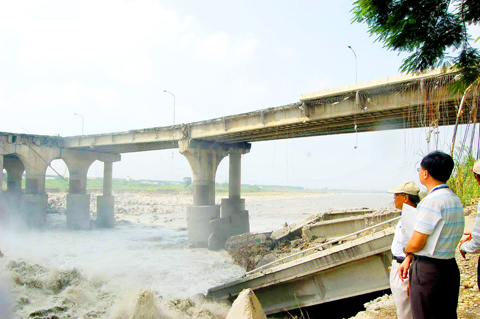President Ma Ying-jeou (馬英九) yesterday declined to comment on whether government officials should apologize or step down to take responsibility for the damage and deaths caused by Typhoon Sinlaku. Instead, he said that the government would complete an investigation within a week.
Typhoon Sinlaku claimed 12 lives and several people remain missing after landslides near the Fengciou Tunnel (豐丘隧道) in Nantou County on Monday and the collapse of part of Houfeng Bridge (后豐橋) on Sunday.
Ma said yesterday that he and Premier Liu Chao-shiuan (劉兆玄) had agreed that the government would decide within a week whether government officials should be held responsible for the deaths.

PHOTO: OU SU-MEI, TAIPEI TIMES
The Nantou District Prosecutors’ Office and Taichung District Prosecutors’ Office have also launched probes into whether any civil servants should be held criminally responsible, he said.
Ma also requested that the Nantou County Government find out whether the hot spring hotels in the county were built legally. He said that any illegally built or condemned buildings should be demolished.
Regarding criticism that he had taken too long to visit the disaster areas, Ma said that he believed that it would not have been a good idea for him to go there before firefighters and rescue workers had completed their work.
He and Liu had different responsibilities, he said, adding that to avoid causing unnecessary trouble, he would rather visit disaster areas after search and rescue operations came to an end, a more appropriate time to determine how to tackle similar problems in future.
At a separate setting earlier yesterday, Liu said the government would determine which officials should take responsibility for the casualties within a week.
“Because of the problems of global warming and climate change, natural disasters pose a greater threat. Although natural disasters are terrible, man-made calamities are intolerable,” Liu said at the Cabinet’s weekly meeting.
Minister of Transportation and Communications Mao Chi-kuo (毛治國) was singled out by some Chinese Nationalist Party (KMT) lawmakers, who demanded he resign over the tragic incidents.
Mao said yesterday that he would reflect on the situation, but stopped short of taking any responsibility.

Chinese spouse and influencer Guan Guan’s (關關) residency permit has been revoked for repeatedly posting pro-China videos that threaten national security, the National Immigration Agency confirmed today. Guan Guan has said many controversial statements in her videos posted to Douyin (抖音), including “the red flag will soon be painted all over Taiwan” and “Taiwan is an inseparable part of China,” and expressing hope for expedited reunification. The agency last year received multiple reports alleging that Guan Guan had advocated for armed reunification. After verifying the reports, the agency last month issued a notice requiring her to appear and explain her actions. Guan

GIVE AND TAKE: Blood demand continues to rise each year, while fewer young donors are available due to the nation’s falling birthrate, a doctor said Blood donors can redeem points earned from donations to obtain limited edition Formosan black bear travel mugs, the Kaohsiung Blood Center said yesterday, as it announced a goal of stocking 20,000 units of blood prior to the Lunar New Year. The last month of the lunar year is National Blood Donation Month, when local centers seek to stockpile blood for use during the Lunar New Year holiday. The blood demand in southern Taiwan — including Tainan and Kaohsiung, as well as Chiayi, Pingtung, Penghu and Taitung counties — is about 2,000 units per day, the center said. The donation campaign aims to boost

A preclearance service to facilitate entry for people traveling to select airports in Japan would be available from Thursday next week to Feb. 25 at Taiwan Taoyuan International Airport, Taoyuan International Airport Corp (TIAC) said on Tuesday. The service was first made available to Taiwanese travelers throughout the winter vacation of 2024 and during the Lunar New Year holiday. In addition to flights to the Japanese cities of Hakodate, Asahikawa, Akita, Sendai, Niigata, Okayama, Takamatsu, Kumamoto and Kagoshima, the service would be available to travelers to Kobe and Oita. The service can be accessed by passengers of 15 flight routes operated by

The Kaohsiung Tourism Bureau audited six hotels in an effort to prevent price gouging ahead of Korean band BTS’ concert tour in the city scheduled for Nov. 19, 21 and 22 this year. The bureau on Friday said that the audits — conducted in response to allegations of unfair pricing posted on social media — found no wrongdoing. These establishments included the local branches of Chateau de Chine, Hotel Nikko, My Humble House, and Grand Hai Lai, it said, adding that the Consumer Protection Commission would have penalized price gougers had the accusations been substantiated. The bureau said the Tourism Development Act